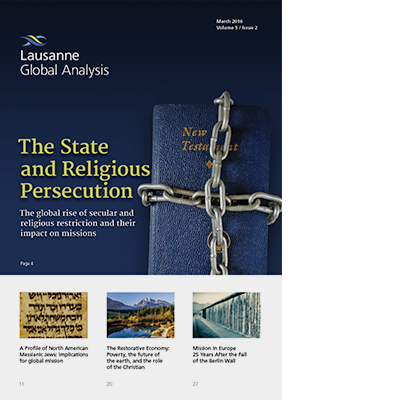Welcome to the March issue of Lausanne Global Analysis. We look forward to your feedback on it.
In this issue we focus on the global rise of secular and religious restriction of minority faiths and their impact on missions; the implications for global mission of the findings of a recent survey of North American Messianic Jews; the ‘Restorative Economy’ and the role of the Christian in it; and mission in Europe 25 years after the fall of the Berlin Wall.
Recent Pew reports document an increase in official intolerance and restriction of minority religious faiths to unprecedented levels, noting that they are far more likely in countries where one religion or ideology dominates. ‘What appears to be the inner logic that justifies it has much to do with national identity and ideology, whether that is secular or religious’, writes Tom Harvey (Academic Dean of the Oxford Centre for Mission Studies). It appears that religious and ideological discrimination against Christianity around the globe will rise. For evangelical Christians, awareness of this and some of the underlying causes should serve to forewarn and forearm. An evangelical emphasis on nurturing societies that encourage openness, tolerance, and diversity of religious expression would be beneficial to mission and ministry globally. ‘Hence it would be prudential for evangelicals reach out to and establish strategic alliances with civil libertarians and groups advocating human rights—especially those arguing for freedom of religion’, he concludes.
‘Most Jewish people today continue to resist the message of Jesus’, writes Andrew Barron (Director of Jews for Jesus in Canada). ‘My qualitative research attempted to understand this resistance in relation to the hardening of Israel (Rom 11:25).’ That ethnic Israel has survived seems to be related to this phenomenon. Responses to survey questions showed that Jewish people in North America are experiencing adversity as they hear and respond to the Gospel. Issues surrounding cultural guidelines and social control are familiar to anyone involved in cross-cultural missions. The particular issues in Jewish mission resemble common phenomena that vary from society to society. Loss of categories, secularism, and urbanization are changing the way younger generations are experiencing social control. ‘I believe that the concerns which flow from my research are foundational to global mission concerns’, he concludes.
In September, world leaders in New York adopted ‘The Global Goals’ affirming their commitment to a better world: free from poverty, with a restored environment, peace, and equality. However, few appear prepared to face up to the scale of change required to meet these ambitious targets. ‘As Christians, are we prepared to step into the breach?’ asks Richard Gower (Director of Foresight Economics). Scripture presents us with a holistic vision for the whole of creation. The hope of the gospel is in the restoration of all things. The Old Testament Jubilee system offers a glimpse of the outworking of shalom in economic terms. The ‘Restorative Economy’ is an economic model in which all of us can participate as creative producers rather than simply passive consumers. Convincing governments to make big systemic changes requires a broader shift in society’s values. ‘Change starts with us, and our lifestyles, and relies on the creation of a passionate movement for change’, he concludes.
‘Over the last 25 years, there seems to have been a sober re-assessment of the evangelical euphoria that was apparent during the early 1990s in Central and Eastern Europe’, writes Darrell Jackson (Senior Lecturer in Missiology at Morling College). These early years saw an unprecedented openness to the Gospel and a plethora of initiatives. The missionary activity of recent years has become more sensitive to the local context. In taking seriously their missionary commitment to Europe, some Christian churches and individuals are also engaging their Christian worldview with the largely secular corridors of power. The European Union is now required to serve and reflect the interests of 28 countries, many of them much more ‘non-secular’ than the pre-2004 ‘club of 15’. ‘Engaging with European institutions will remain problematic for evangelicals and other people of faith but it does at least open up the possibility of another way of re-introducing the people of Europe to a convincing and compelling account of the Christian faith and the witness it gives to the Gospel of Jesus’, he concludes.
Whether you are planning to read the full articles or just the executive summaries, we hope that you find this issue stimulating and useful. Our aim is to deliver strategic and credible analysis, information, and insight so that as an influencer you will be better equipped for the task of global mission. It’s our desire that the analysis of current and future trends and developments will help you and your team make better decisions about the stewardship of all that God has entrusted to your care.
Please send any questions and comments about this issue to analysis@lausanne.org. The next issue of Lausanne Global Analysis will be released in May.

